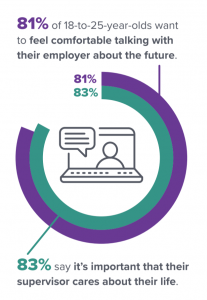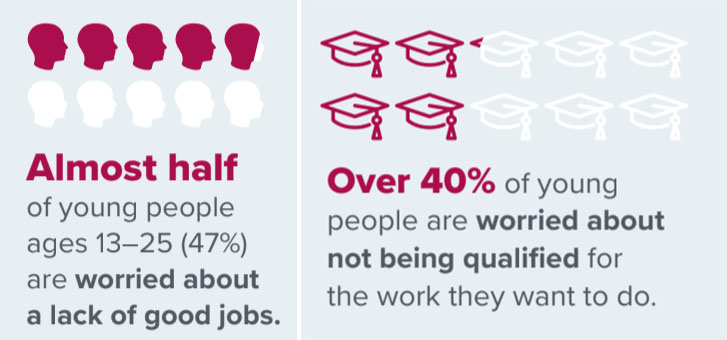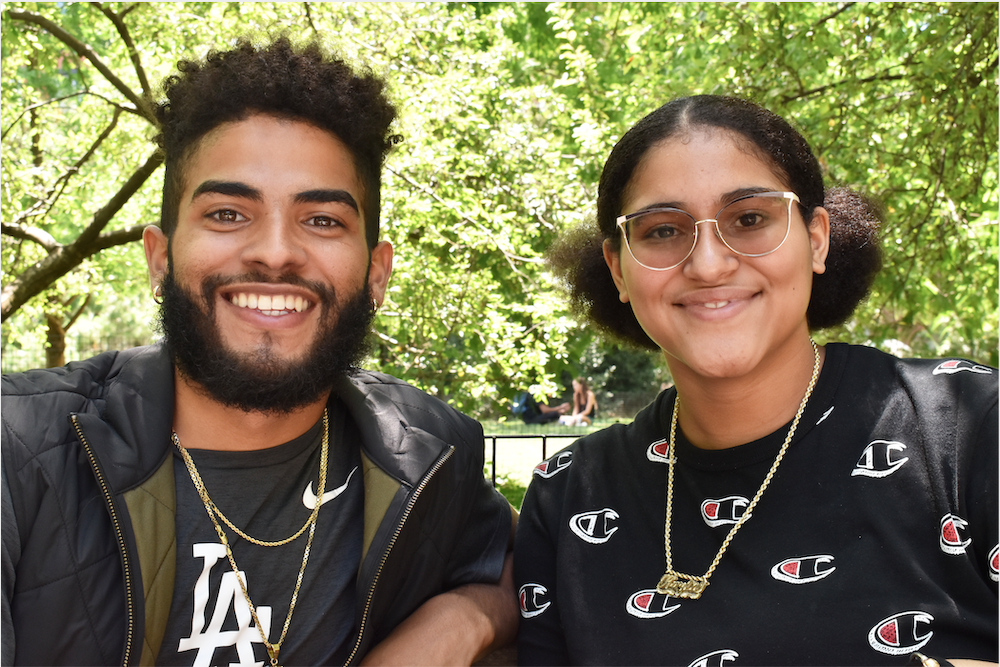Gen Z: New Study Finds Concerns of Mentorship and Making Labor Valuable Among the Youngest and Most Diverse Generation

Get essential education news and commentary delivered straight to your inbox. Sign up here for The 74’s daily newsletter.
A far-reaching study has found Generation Z could shake up the workplace, transforming how it has operated for decades.
The survey of nearly 7,000 13-25-year-olds Gen Z’ers — the nation’s most ethnically and racially diverse generation ever — by the Springtide Research Institute found a majority want work to be meaningful, don’t have a mentor, are worried about work/life balance, and are concerned their gender or racial identity may prevent them from finding work.
“Work is not just going to be a place for work; it’s going to be a place for Gen Z where they make meaning for their whole lives,” said Executive Director Dr. Josh Packard of the study, “Work/Life Helping Gen Z Flourish & Find Balance.”
“One of the big trends that matters is trust, because you’ve got a generation who has now lived through two big recessions fairly close in succession and is also not only the most diverse generation in history but also cares about diversity,” Packard continued.
The two big economic recessions, one in 2008 and the current financial crisis caused by the pandemic, have also fueled the generation’s anxiety, with the oldest and youngest having the biggest concerns.

Many Gen Z’ers also believe their racial or gender identity will influence their search for work; 1 in 5 Gen Z’ers said they will have a hard time finding a job because of their race, and females express less security in their financial lives than their male peers.
The study breaks down three core concepts of mentorship, meaning, and growth in Gen Z’s perspectives of life and work, and what they want out of it.
Mentorship in the workplace is crucial as 82% young people report it’s important their supervisor helps them set performance goals; and 83% say they want their supervisor to care about their life.

Springtide found the experiences of Gen Z’ers is not monolithic, as access to mentorship varies based on racial identity, finding “white young people have more access to mentors in life” than Hispanic/Latino and Black peers and that 60% of the white young people said they knew “someone who listens” compared to 51% of Hispanic and Latino and 41% of Black Gen Z’ers.
The experience of having a mentor in life influences young people’s expectations for a mentor at work. Since Hispanic/Latino and Black Gen Z’ers often have less experience with mentorship than white Gen Z’ers, they don’t carry the same expectations of their supervisors to care for and guide them.
Gen Z has also shown a desire to find value in work and in their lives in general, as 74% of young people claim they want the things they do to have a purpose. Meaning for Gen Z’ers also includes growth, and being able to change as a person, as 87% want a job where they can learn a lot.
While many interpret meaning in different ways, Gen Z believes it needs to not only fulfill themselves but others, as 86% said want to make a difference with their jobs.
In fact, 70% of 13-to-17-year-olds told the Institute they believe work is not worth doing if it is not meaningful to them; and nearly 3 out of 4 young people say what they do as a job is a part of who they are.

Other stats from “work life balance:”
- Over 40% of Gen Z are worried about not being qualified for the work they want to do.
- 47% of 13-25-year-olds are worried about “a lack of good jobs.”
- Only 38% have someone who models good work ethic and healthy relationships.
- 73% of young people say they are more likely to do extra work when they believe in what they are doing.
- 87% of 13-to-25-year-olds believe they are “responsible for making their own meaning at work”
The 74 Million found several Gen Z’ers who echoed the sentiment and findings of the Springtide Institute, in topics such as work and life balance, mentorship, and meaningful work.

Nathan Hall, 21
Campus Attendant at the American Musical and Dramatic Academy, Barista
“I am absolutely worried about sacrificing a part of (my) time and hobbies for work. Worried about hours always because New York is expensive. I’m an actor, and my industry is taking a bit of a hit right now. Work to me is whatever can pay rent and get enough money to get by, it’s unfortunate. I wish I could spend more time doing what I actually want to do. But that’s just not how it is.”

Kaylie, 14
Student, Woodrow Wilson Middle School, Clifton, New Jersey
“Some teachers when it comes to certain things, you get attached to them, [like] my sixth grade teacher who I still talk to a lot of the time. He helped me through a lot, transitioning from elementary school to middle school, and especially during the quarantine. When everything went online, it was hard for me to transition, but my relationships with counselors and teachers helped a lot…. to balance everything out with them.”
Carlos Polanco, 22
Graduated Senior, Dartmouth College
“Mentors are important, especially in the workplace. Having people who can stick up for you and people who you can ask questions…It’s also very important when you’re from an underrepresented background, in my experience as someone who is Black and Latinx, there have been very few people who look like me or come from similar backgrounds in places where I worked.”

Yana Gitelman, 18
Rising Freshman, Georgetown University
I had a teacher in school who is (also) a clinical psychologist… and he told me how a lot of his clients and parents at our school live and work for their vacations. They’re miserable most of the year, and then get a super nice, fancy vacation where they’re happy for two weeks. I want work to feel like fun and not like I’m just like getting through the week to get to the weekends.”

Ethan Siede, 22
Rising Senior Princeton, Microsoft Software Engineering Intern
“I am very passionate about my work, and I don’t think I would want to do something that I wasn’t passionate about. It’s important to balance out work and life, and I think when you’re in your 20’s it’s better if you work a little bit more. But I think there’s only a limit to that, because those who do like 100 hour work weeks, I think that’s just wasting your 20’s.”

Julia Clark, 17
Rising Freshman, Williams College
“I want work that still makes me excited because I don’t want to have a job that I dread… even if it pays really well. I don’t want to think of it as a job; I want to think of it as a passion that I’m just lucky enough to get paid for.”
Get stories like these delivered straight to your inbox. Sign up for The 74 Newsletter

